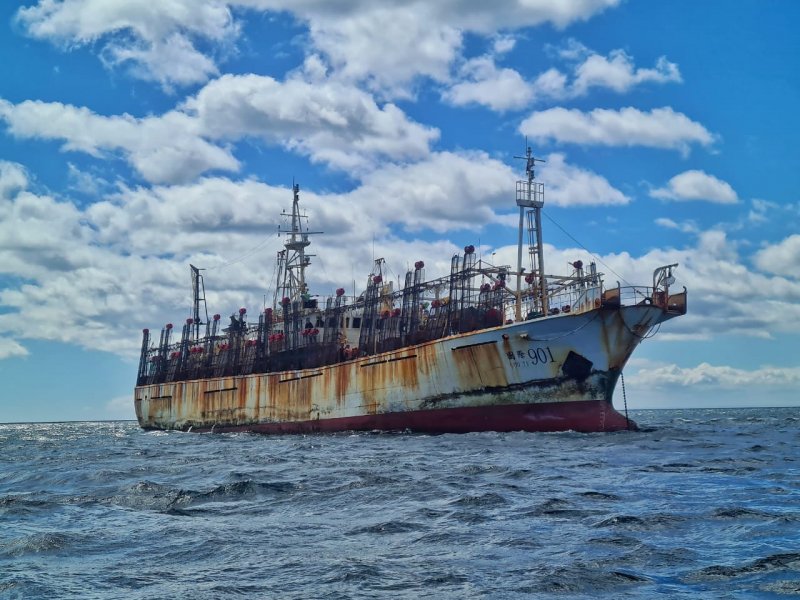
Spanish – The threat of Chinese pirates in South America continues. Alarms are now being raised in Argentina, whereas in Chile, authorities have opted to deploy naval and air units to monitor its waters.
Approximately 200 ships flying the flag of the Asian country are sailing outside the 200 miles of the Exclusive Economic Zone (EEZ) of that country, after a crossing the Strait of Magellan from the Pacific Ocean, where they sailed off the coasts of Ecuador, Peru, and Chile, reports Infobae.
The ships have been advancing for months through the waters of the region to source marine species which are sold in the Chinese market. The great demand represents an imminent danger for protected species in these areas.
The operation will also include a major surveillance mission between the Navy and the Prefecture to increase the number of officers and equipment available, such as the ARA Bouchard ocean patrol vessel, the first of four vessels of this caliber purchased by the Argentine Navy.
The delicate situation seems to get tense as time goes by. More and more Chinese ships are deploying their illegal activities in waters from the Pacific Ocean to the Atlantic, without the Xi Jinping government taking a stand against the ecological threat and the illegality of fishing in international waters.
Tepid Argentinean laws
The Argentine laws are not strong against this activity either, says Infobae, since illegal fishing is classified as an “infraction” and not a “crime.” Although fines have been increased, Argentina’s policy is to not attack boats.
Moreover, the authorities limit themselves to firing warning shots, and only if they escape can they be prosecuted for resistance to authority.
One persecution occurred in May when the ship Lu Rong Yuan Yu 668 escaped from Argentine authorities after being captured in April. The boat was placed at the disposal of the Federal Court in Rawson, Chubut province.
The Argentine magazine Puerto reported at that time that the Chinese shipping company would be willing to pay the administrative fine for violating the Federal Fishing Regime (calculated at a maximum of 10 million pesos), but that if they were to join the process they would have the benefit of a 25% discount.
By the beginning of December, it was already evident that 27 Chinese fishing boats were arriving in the Atlantic and threatening the natural resources of the Argentine sea, according to another Infobae article.
The Argentine Naval Prefecture was monitoring them through a Geographic Information System, a key mechanism against vessels that turn off their tracking systems to violate international waters and proceed with fishing.
The great threat to China
It is estimated that 17,000 Chinese ships sail in search of natural resources around the planet, adds the same portal.
The United States has its eye on the advance of pirates. The embassy in Peru warned in September that some 300 Chinese pirate ships were off the coast of Peru engaged in illegal fishing.
In this crusade, the Ecuadorian Navy issued another alert in July for a fleet of some 260 ships stationed off the Exclusive Economic Zone (EEZ) around the Galapagos Islands, a world heritage site.
The group of 300 ships off the Peruvian coast was suspiciously reduced to 126, according to the NGO Oceana, which monitors the seas. The Chinese ships reportedly once again used the traditional tactic of disabling the monitoring systems.
“We know that these boats did not disappear, and we see few of them leaving the area. The size of this fleet should be cause enough for concern, and even more so when they are probably turning off their automatic identification systems,” said Marla Valentine, illegal fishing and transparency analyst at Oceana’s office in the United States.
Slavery on Fishing Vessels
Not only do marine species suffer; the workers on board these ships are also victims of inhumane treatment.
Alexis Olivares is a Chilean who began working on one of these vessels in exchange for 400 dollars a month. However, what he got on the ships was nothing more than horror and slavery.
Olivares said that they were forced to work 18 hours a day because a satellite sent information 24 hours a day about the temperature of the water. If it was the right one, they immediately proceeded to fish species such as swordfish, tuna, sharks, cuttlefish, and squid.
“What they love most is the shark because they only take its fins off and the rest they throw away,” he said in statements recorded by Infobae.
The cruelty of the Chinese rulers seems to have no limits when feeding their crew with rice and some fish rations.
“When the captain saw that a Chinese worker was not working, he beat him. That is why I tell you that if the (Chilean) Navy took a ship and brought it to Valparaiso or Iquique, they would land half of it,” said Olivares.
 Versión Español
Versión Español













